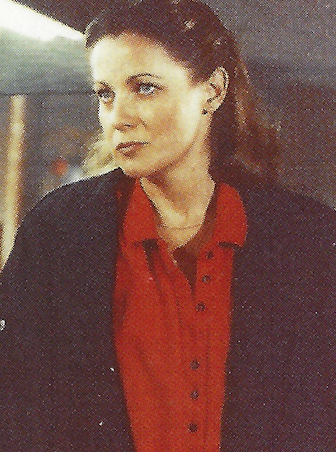Sunday, March 4, 1990
THE FIRST SEASON. Written by Brian Ross and Victor Nicolle. Music by Graeme Coleman. Directed by Ralph Thomas. Running time: 92 minutes. Rated Mature with the B.C. Classifier’s warning: "some very coarse language, occasional violence and suggestive scenes.”
FOR THE RECORD, THERE are few hard facts. The authorities are sure of only two things.
First, the Lady Day was found empty. A fishing boat operating out of Tofino, it was some distance from its reported position.
Second, Frank Cauldwell (Dwight Koss) is dead. The Lady Day's skipper, he'd put out to sea alone in an attempt to break a run of bad luck.
The insurance company suspects suicide. Filmgoers, privy to more information than any of the story's characters, know that the company is right.
The First Season opens with the debt-burdened Cauldwell making his final declaration of love to his wife Alex (Kate Trotter). Later, we actually see the despondent fisherman step off his vessel's stern.
For the record, The First Season is a film without a directorial credit. Though he saw the picture through to post-production, Ralph (The Terry Fox Story) Thomas then stepped off its stern.
Citing the usual "creative differences," the movie's producers agreed to remove his name from the B.C.-made feature.
Filmgoers, of course, are privy to none of the backstage details. To us, the only thing that really matters is the condition of the finished film.
Technically, it's a good show. Cinematographer Richard Leiterman and editor Frank Irvine are both Genie Award nominees for their work here.
The first theatrical feature to focus on the Pacific Coast fishery since 1974's The Inbreaker, it was produced by Robert Frederick, whose credits include such local TV series staples as The Beachcombers and MacGyver.
Dramatically, it's in tune with the recent cinematic interest in the problems of widowhood. In common with Jane Fonda (in 1990's Stanley & Iris) and Jessica Lange (Men Don't Leave; 1990), Kate Trotter plays a woman attempting to deal with issues of economic survival and emotional re-adjustment.
Unlike her better-known acting sisters, she benefits from a screenplay that makes internal sense. Allowing for a level of melodrama — Eric Anderson (R.H. Thomson), the boozy deckhand who signs on with Alex, has a dark secret similar to that of a certain violence-prone 1982 visitor to Hope — The First Season provides a more satisfying resolution to her problems than either of the Hollywood-made features.
Having lost her husband, Alex refuses to give up on the Lady Day. "That boat was our dream," she tells family friend Ruth Kelsey (Barbara Russell).
"I know," says Kelsey. "But you do have to wake up sometime."
"The dream's over, mom!" says Alex's angry, grieving daughter Jodie (Christianne Hirt). "Dad's gone. That boat took him away!"
Like all those heroic rural moms in all those family farm films made in the mid-1980s, Alex is determined to save what she's inherited. Both the sentiment and the film have considerable merit.
The above is a restored version of a Province review by Michael Walsh originally published in 1990. For additional information on this archived material, please visit my FAQ.
Afterword: In 1990, readers of the above review would have had no difficulty remembering the name of that “violence-prone 1982 visitor to Hope.” John Rambo, played by Sylvester Stallone in director Ted Kotcheff’s filmed-in-B.C. action drama First Blood, was by then part of the popular culture, and a familiar face from 1985’s Rambo: First Blood Part II and Rambo III (1985). As with Rambo, Eric Anderson’s “dark secret” can be traced back to his military service in Viet Nam.
The First Season was Toronto-based actress Kate Trotter’s first feature-film starring role and, as far as I can tell, her only working visit to Vancouver. In the decade before crossing the Rockies, she’d established herself as a familiar presence on the stage, in films and on television in Central Canada. In the three decades since, she has worked steadily, dividing her time between stage and screen, adding credits as a director of plays, dramatic films and documentaries. Unlike many of her contemporaries, she chose not to seek her success in the U.S. Like her First Season character Alex, she focused her strength and independence on making it happen in Canada. In a 2017 interview with the poet James Strecker, she described herself as “an actress. I was born and raised on a farm. What got me from there to here is a mystery.” Most recently seen in the Hallmark seasonal TV feature The Christmas Club, and the theatrical feature The Silence (both 2019), Kate Trotter turns 67 today (February 5).
